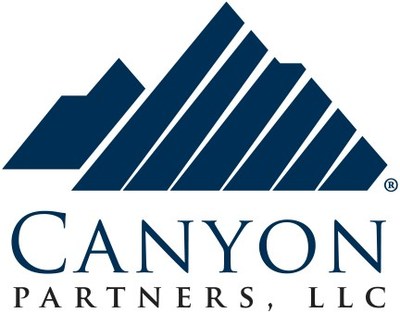River Canyon Total Return Bond Fund Surpasses $1 Billion AUM Milestone
LOS ANGELES, Dec. 7, 2021 /PRNewswire/ -- Canyon Partners ("Canyon"), a global alternative asset manager, is pleased to announce that the River Canyon Total Return Bond Fund (ticker: RCTIX) (the "Fund") has surpassed
RCTIX is a total return credit strategy that invests across the full spectrum of the
"We attribute RCTIX's growth to its consistent track record of outperformance across a broad range of market environments in conjunction with growing demand for diversification away from generic fixed income sectors that offer tight spreads and low overall yields," said George Jikovski, Senior Portfolio Manager and Head of Structured Products at Canyon Partners. "We look forward to continuing to serve our clients in what is shaping up to be a potentially challenging macro landscape."
River Canyon was established in 2013 to extend Canyon's expertise in stressed, distressed and special situation investments into the more liquid areas of the credit universe. The Fund's portfolio management team is supported by Canyon's broader investment platform and resources, and the Fund's value-oriented credit selection process is consistent with Canyon's general approach to investing – a combination of in-depth research, scenario analysis and risk management to maximize upside capture, with a low-to-negative downside capture.
Canyon's distribution efforts for the Fund are primarily focused in the intermediary and private wealth management channels, where the majority of the Fund's assets have originated. Canyon works closely with global banks, existing and prospective institutional clients and the larger ultra-high-net-worth marketplace to expand access to RCTIX for a wider range of investors.
About River Canyon Fund Management
In 2013, Canyon Partners established River Canyon Fund Management as an investment advisor for its more liquid credit strategies. With an emphasis on structured credit, River Canyon's mandates include the River Canyon Total Return Bond Fund as well as bespoke separately managed accounts designed to fit investor objectives. These strategies bring to bear the full resources of the Canyon platform, including the experienced credit research, trading, legal, compliance, and operations teams.
For more information please visit: https://www.rivercanyonfunds.com.
About Canyon Partners, LLC
Founded and partner owned since 1990, Canyon employs a deep value, credit intensive approach across its investment platform. Canyon specializes in value-oriented special situation investments for endowments, foundations, pension funds, sovereign wealth funds, family offices and other institutional investors. The firm invests across a broad range of asset classes, including distressed loans, corporate bonds, convertible bonds, securitized assets, direct investments, real estate, arbitrage, and event-oriented equities.
For more information visit: www.canyonpartners.com.
Media Inquiries:
Morgan McGinnis
Prosek Partners
pro-canyon@prosek.com
208.251.9717
DISCLOSURES:
For RCTIX standard performance, please see the link: https://www.rivercanyonfunds.com/total-return-bond/
The Fund's benchmarks for performance comparison purposes are the Bloomberg Barclays U.S. Aggregate Bond Index. The Bloomberg Barclays U.S. Aggregate Bond Index is an unmanaged index that measures the investment grade, US dollar-denominated, fixed-rate taxable bond market. The index includes Treasuries, government-related and corporate securities, mortgage pass-through securities, and asset-backed securities.
A credit spread is the difference in yield between a U.S. Treasury bond and another debt security of the same maturity but different credit quality. Credit spreads between U.S. Treasuries and other bond issuances are measured in basis points, with a
Upside/downside capture ratio show you whether a given fund has outperformed--gained more or lost less than--a broad market benchmark during periods of market strength and weakness, and if so, by how much.
Morningstar Rating™ as of 31 October 2021 for the Inst. series; other classes may have different performance characteristics. The River Canyon Total Return Bond Fund received an overall rating of 5 stars out of 549 funds, 3-year rating of 5 stars out of 549 funds, and 5-year rating of 5 stars out of 482 funds, based on risk-adjusted returns.
The Morningstar Rating™ for funds, or "star rating", is calculated for managed products (including mutual funds, variable annuity and variable life subaccounts, exchange traded funds, closed end funds, and separate accounts) with at least a three year history. Exchange traded funds and open ended mutual funds are considered a single population for comparative purposes. It is calculated based on a Morningstar Risk Adjusted Return measure that accounts for variation in a managed product's monthly excess performance, placing more emphasis on downward variations and rewarding consistent performance. The top
Past performance is no guarantee of future results.
PRINCIPAL INVESTMENT RISKS
Investment Risk. It is important to note that the Fund is not guaranteed by the U.S. Government. Fixed income investments involve interest rate risk, issuer credit risk and risk of default, and price volatility risk as detailed below. Funds investing in bonds can lose their value as interest rates rise, and investors participating in such Funds can suffer a partial or total loss of their principal. The Fund invests in asset backed and mortgaged backed securities which may be more volatile than other fixed income securities and influenced by the housing markets or markets from which the collateral is drawn.
Fixed Income Risk. When the Fund invests in fixed income securities, the value of the Fund will fluctuate with changes in interest rates. Defaults by fixed income issuers in which the Fund invests will negatively affect performance.
Interest Rate Risk. Interest rate risk refers to changes in interest rates that will affect the value of a portfolio's investments in fixed income securities. When interest rates rise, the value of investments in fixed income securities tends to fall and this decrease in value may not be offset by higher income from new investments. On the other hand, if interest rates fall, the value of fixed income investments generally increases. Interest rate risk is generally greater for fixed-income securities with longer maturities or durations. Interest rates in the U.S. recently have been near or at historically low levels. Consequently, the risk associated with rising interest rates are heightened at this time.
Credit Risk. Fixed income securities are subject to varying degrees of credit risk. Credit risk is often reflected in credit ratings. The value of an issuer's securities held by the Fund may decline in response to adverse developments with respect to the issuer. If an issuer or guarantor of a security held by the Fund or a counterparty to a financial contract with the Fund defaults or is downgraded, or is perceived to be less creditworthy, or if the value of the assets underlying a security declines, the value of an investment in the Fund typically will decline. High yield securities and unrated securities of similar credit quality (commonly known as "junk bonds") have a higher risk of default and are considered speculative. High yield securities also may be more volatile than higher-rated securities of similar maturity.
Market Risk. Market risk refers to the risk related to investments in securities in general and the daily fluctuations in the securities markets. The market prices of the Fund's securities may go up or down, sometimes rapidly or unpredictably, due to many factors, including fluctuation in interest rates, lack of liquidity in the bond market, national and international economic conditions, adverse investor sentiment and general market conditions.
Asset Backed, Mortgage-Related, Mortgage-Backed Securities Risk. These types of securities are subject to the risks affecting fixed income securities generally and may be particularly volatile. In addition, the value of these securities will be influenced by factors affecting the housing markets or markets from which the collateral is drawn. Some of these securities may receive little or no collateral protection from the underlying assets. All of these risks are heightened for mortgage-backed securities that include "sub-prime" mortgages. In addition, the structure of some of these securities is complex and there may be less available information than for other types of securities.
The River Canyon Total Return Bond Fund is offered only by prospectus. The prospectus contains important information, including investment objectives, risks, advisory fees and expenses. Please read the Prospectus carefully before investing or sending money. For a current Prospectus please call 800-245-0371.
Distributed by Foreside Financial Services, LLC.
© River Canyon Fund Management. All rights reserved. For a more complete list of Fund risks, please see the Prospectus.
1 As of 11/18/21
![]() View original content to download multimedia:https://www.prnewswire.com/news-releases/river-canyon-total-return-bond-fund-surpasses-1-billion-aum-milestone-301439023.html
View original content to download multimedia:https://www.prnewswire.com/news-releases/river-canyon-total-return-bond-fund-surpasses-1-billion-aum-milestone-301439023.html
SOURCE Canyon Partners, LLC








